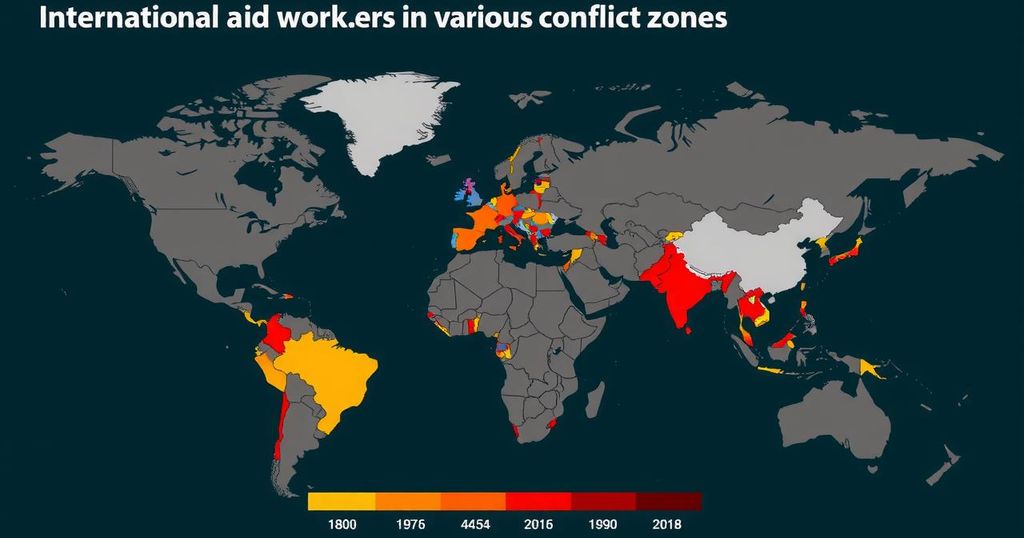The OCHA reports 2024 as the deadliest year for aid workers, with 281 fatalities, primarily due to violence in Gaza. Humanitarian crises escalate in several regions, including Lebanon, Haiti, and Ukraine, prompting urgent needs for protection, aid delivery, and shelter as winter approaches.
As of 2024, the United Nations Office for the Coordination of Humanitarian Affairs (OCHA) has reported that humanitarian workers face unprecedented dangers, becoming the most threatened group in conflict zones. In a somber report, 281 aid workers have been killed this year alone, surpassing last year’s 280 fatalities. Under-Secretary-General for Humanitarian Affairs, Tom Fletcher, emphasized the urgent need for protection and accountability, condemning the violence against these vital personnel.
The ongoing situation in Gaza has contributed significantly to these tragic statistics, with over 320 aid workers killed since October 7, 2022. Furthermore, threats to aid personnel are widespread, encompassing violence, kidnappings, and harassment in nations such as Afghanistan, Sudan, and Ukraine.
In the Occupied Palestinian Territory, the humanitarian crisis is exacerbating daily as Israeli military operations persist. OCHA describes the severe impact of the conflict in Gaza, detailing casualties from airstrikes that have destroyed civilian infrastructure and worsened living conditions. Reports of families losing their homes and access to humanitarian aid paint a grim picture for those affected, with urgent shelter needs as winter approaches. Only a fraction of planned humanitarian missions are being realized due to significant access restrictions.
Lebanon is facing similar hardships, with ongoing airstrikes causing civilian casualties and damaging healthcare facilities. OCHA has documented numerous attacks on health services, and organizations continue to provide winter assistance and food to displaced individuals amid widespread violence.
In Haiti, rising violence has led to the displacement of more than 40,000 people since early November. Despite the volatile environment, humanitarian organizations are addressing urgent water and health needs for those affected by the violence.
Ukraine remains embroiled in conflict as winter sets in, with attacks on energy infrastructure leading to civilian casualties and increasing humanitarian needs. OCHA reports that frontline towns are struggling to access essential services.
Lastly, the Emergency Relief Coordinator has allocated funds to address flood-related humanitarian assistance in Guinea, impacting over 175,000 individuals. The funds are intended to support various needs such as health, food, and education.
This snapshot of humanitarian crises underscores the relentless challenges faced by affected populations globally and the bravery of aid workers striving to deliver assistance under perilous circumstances.
The landscape of humanitarian aid is increasingly perilous, particularly in conflict zones where the risk to aid workers has risen alarmingly. In light of recent events, particularly the ongoing conflict in Gaza and rising violence in Lebanon and Haiti, the humanitarian community is under significant pressure. These crises not only hinder aid delivery but also amplify the suffering of vulnerable populations. Advocacy for the protection of humanitarian workers and the sanctity of humanitarian efforts is crucial, emphasizing the need for compliance with international laws governing aid work.
In conclusion, the state of global humanitarian efforts presents a dire outlook, with significant challenges due to violent conflicts and increased casualties among aid workers. The urgent need for protective measures, adherence to international humanitarian law, and a concerted effort to facilitate aid delivery is paramount. As the situation continues to evolve in Gaza, Lebanon, Haiti, Ukraine, and Guinea, it is vital that the global community remains committed to supporting humanitarian assistance efforts and safeguarding those who risk their lives to help others.
Original Source: www.unocha.org






